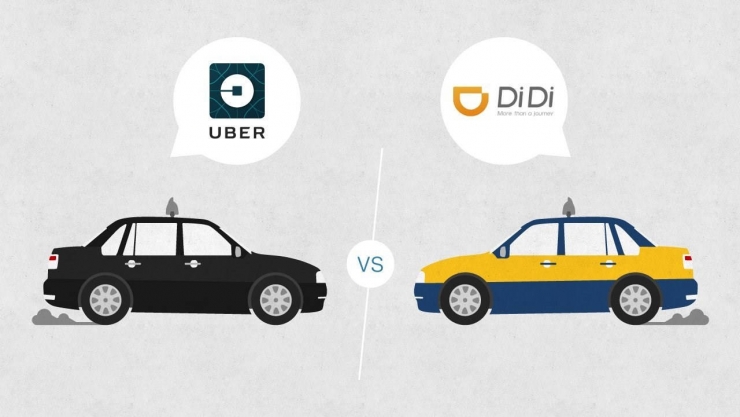The end of the special war, Drip Acquisition Uber China

On the morning of August 1, U.S. media took the lead in reporting that Uber CEO Travis Kalanike published an article on his blog and announced the merger with DDT.
During the afternoon, Didi executives rushed to swear, but in the afternoon, Cheng Wei and Liu Qingfa’s employee letter formally confirmed that Didi will acquire all the assets of Uber China Brand, business, and data.
The open letter stated that after the parties reached a strategic agreement, Didi Travel and Uber Global will hold each other’s shares and become minority shareholders of the other party. Uber Global will hold a 5.89% stake in Didi, which is equivalent to 17.7% of economic equity. Uber China's remaining Chinese shareholders will receive a total of 2.3% of economic equity. Didi therefore became the only company that has invested in Tencent, Alibaba, and Baidu.
At the same time, Cheng Wei, founder and chairman of DDT, will join Uber's global board of directors. Uber founder Travis Kalanick will also join the Dripping Trip Board.
The dual catalysis of capital and policy is reasonable
From the perspective of Didi and Uber's Chinese investors, there are also many intersections between the two largest investors in the global travel market.
Up to now, China Life, Alibaba, Tencent, China Investment, Ping An Innovation Investment Fund, Beiqi, CITIC Capital, Jiazhong Jiazi, Poly Group and other companies and organizations have participated in Didi's financing. HNA Capital, Baidu, Pacific Insurance, GAC Group, CITIC Securities, China Vanke Group, Minsheng Bank (CBI International), Broadband Capital, Shuanghu Capital are investors of Uber in China.
In other words, there are at least four joint investors in Uber and Uber. After the merger of the two parties, the subsidies can be reduced to reduce costs, and this part can be a small expenditure for investors.
LeTV CEO Jia Yueting announced earlier this year that it was easy to exceed Uber as the second industry. From now on, the goal is achieved in advance, but it may not be a good result for easy access.
When Yi Peng’s president Peng Gang accepted an interview with Lei Fengwang (searching “Lei Feng Net†public number) in an interview recently, Dickey and Uber’s simple financing has topped (Uber’s valuation after Saudi’s sovereign fund is still US$62.5 billion), valuations are unlikely to change. Peng Gang also said that the boss is with the old man, and to some extent it has become a policy maker, and he can demand all taxi drivers.
In time, on July 28th, 7 ministries and commissions including the Ministry of Transport issued the Interim Measures for the Management of Online Booking of Taxi Business Services. Against this backdrop, Didi and Uber China announced that the merger itself is very reasonable.
The development of single oligarchs, the destiny of the era
According to the internal letter, “Uber China will maintain its independence in branding and operations, and drivers and passengers will continue to receive stable services. Didi Travel will integrate the management and technical experience and expertise of both teams in user resources, On-line and offline operations and marketing and other aspects share resources and develop collaboratively."
Cheng Wei also stated that Didi's trips will also accelerate the "sail to the sea" and the pace of internationalization, and will begin to globalize from the talent structure, technology reserves and business layout. In addition to continuing to work with global partners to open up local resources, DDT will further advance into other overseas emerging mobile travel markets such as Hong Kong, Macau, Taiwan, Japan, South Korea, Europe, and Russia. In order to be able to compete with the global in the field of artificial intelligence and big data, Didi has already established a Silicon Valley R&D center in Silicon Valley, and has considered setting up similar R&D centers in the UK and Russia and attracting top talents in the world.
The merger clearly contributes to the performance of these indicators. For example, the competition between the two companies, especially in the Chinese market, will be greatly eased. This is both a positive factor in costs and will allow the two companies to put more efforts into each other. With respect to the establishment of competitive barriers and the development and solidification of profit models, the two companies will have more pronounced global network effects, which is crucial for improving user experience and barriers to competition. At the same time, the valuation can be further improved in the expansion of other businesses, the current valuation of 35 billion US dollars, almost equal to BAT Baidu 560 US dollars, the market share will reach 93.1%, in an absolute monopoly.
Just like the major mergers and acquisitions in 2015, the single oligopolistic Internet era is still moving toward this step.
Although the merger has been finalized, there are still many problems left behind: After the merger, is there any incentive for passengers to ride? Does the driver still have subsidies? Does a company need to use two clients and two teams? If you want to layoffs, what will be the ratio? In addition, will Uber China still face competition from Uber globally after it is in the pocket?
For today’s merger, the industry commented arrogantly: “DJD’s acquisition of Uber in China was finalized, but it feels like the quick merger has not lasted as long as 16 months. For the merger, Didi will really pick the time, and the time of the merger with the fast is Valentine's Day, this time is near the Tanabata, so that the good days of marriage is very important.